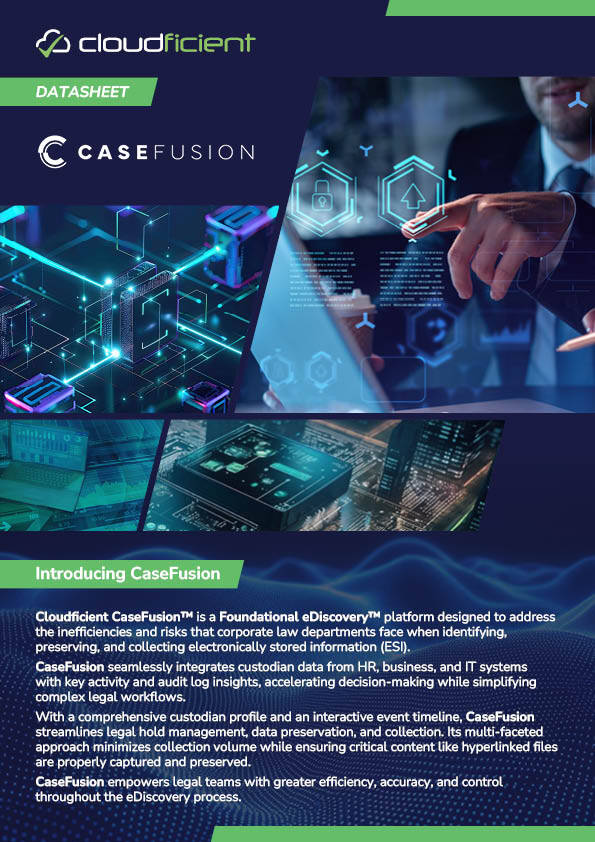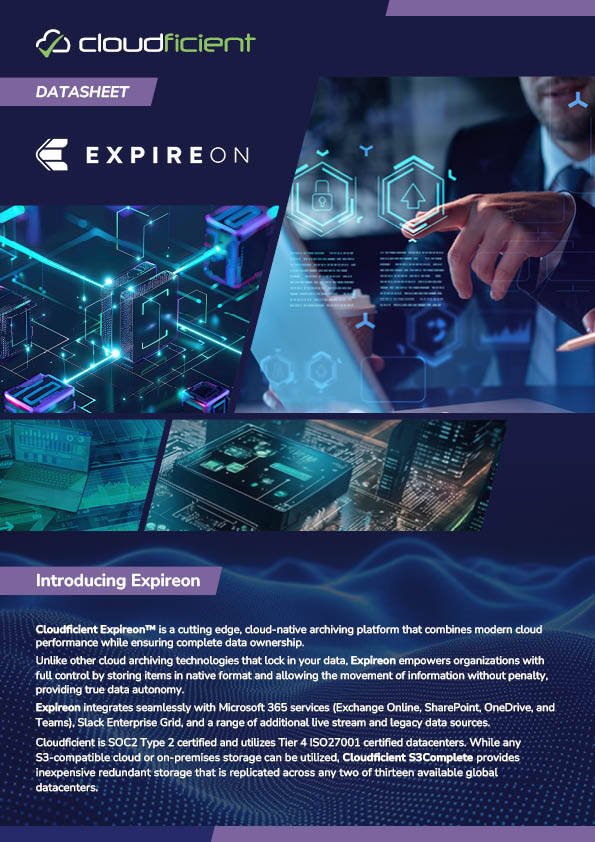- Solutions
- Foundational eDiscovery
- Early Case Assessment
Early Case Assessment Is The First Step Toward Defensibility
Strong Early Case Assessment (ECA) practices bring visibility to custodians, data sources, and timelines long before the first review batch. Legal teams gain speed, control, and reduce review costs without sacrificing compliance.
Poor Early Case Assessment Undermines Entire eDiscovery Process
When not managed strategically, the eDiscovery process can quickly descend into chaos, characterized by fragmented data, ballooning costs, and elevated risks, often stemming from inadequate Early Case Assessment. Several critical challenges prevent legal teams from maintaining control, from inefficient collections to the underutilization of smart filtering tools vital for ECA.
Who? What? Where? Data Intelligence Matters
Legal teams continue to struggle with the foundational challenge of linking custodians to the right data sources in a timely, contextual manner. Disconnected mapping leads to inefficiencies, missed insights, and increased risk.
Key Challenges:
-
Fragmented Custodian Intelligence: Difficulty identifying who holds relevant data and their relationships to key facts or timelines.
-
Scattered Data Sources: Critical data resides across disparate formats such as emails, spreadsheets, and shared drives without centralized visibility.
-
Chronology and Context Gaps: Inability to track custodian involvement over time weakens legal narratives and discovery strategies.
-
Collection Inefficiencies: Overcollection or under-collection due to incomplete custodian data mapping.
-
Missed Relevance Links: Lost opportunities to correlate people, data, and case events dynamically.


Data Volume, Multi-platforms, Emerging Data Types
The sheer volume and diversity of data formats and platforms challenge traditional eDiscovery workflows. ECA must now account for where data lives and how it behaves.
Key Challenges:
-
Exponential ESI (Electronically Stored Information) Growth: Emails, chats, cloud documents, multimedia, and collaborative platforms produce data at scale.
-
Data Complexity: Modern attachments (e.g., links instead of files) and multi-format records add layers of review complexity.
-
Platform Proliferation: Cloud storage, on-premises systems, and hybrid environments complicate access and review.
-
Outdated Systems: Legacy tools lack compatibility with new data formats and fail to support large-scale, automated processing.
-
Modern Data Sources: Slack, Teams, mobile messaging, social media, IoT, and call data demand new preservation and interpretation methods.
-
Poor Workflow Integration: Inadequate alignment between Early Case Assessment (ECA) processes and enterprise tech stacks hinders defensibility and speed.
Smart Filtering
Data triage remains underutilized, with many legal teams still relying on manual filtering of ROT data, high-value vs low-value data, and metadata delaying insight and increasing cost.
Key Challenges:
-
ROT Overload: Inability to automatically remove redundant, obsolete, and trivial (ROT) data extends review timelines.
-
Insufficient Data Reduction: Failure to minimize non-relevant data early leads to inflated review sets and delays in strategic decision-making.
-
Manual Review Bottlenecks: Overreliance on human effort slows early data assessment and drives up cost.
-
Incomplete Metadata Analysis: Gaps in metadata analysis hinder filtering precision and reduce the effectiveness of Early Case Assessment.
-
Underused AI Tools: Missed opportunities to deploy intelligent filtering and classification that optimize early decision-making.
-
Costly Overcollection: Without strategic triage, teams often collect more than necessary, increasing review burdens.


Costs & Resources
Budget and resource constraints, especially for smaller legal departments, make ECA adoption uneven and reactive rather than strategic.
Key Challenges:
-
High Cost of Review: Document review often comprises up to 80% of total eDiscovery spend.
-
Resource Gaps: Legal, IT, and compliance teams are frequently under-resourced and overstretched.
-
Lack of Cross-Functional Alignment: Silos between legal, IT, and vendors hinder collaboration and speed.
-
Unpredictable Scope: Reactive discovery planning leads to hidden costs, timeline creep, and overcollection by up to 80%.
-
Tool Deficiencies: Many current tools fail to scale or integrate across the litigation lifecycle.
-
Limited Training: Teams lack the skills and knowledge to effectively deploy advanced ECA technologies.
Compliance Risks, Privacy, Security
As regulations tighten and data crosses more boundaries, the legal risk profile of data handling continues to rise.
Key challenges:
-
Regulatory Complexity: Navigating GDPR, CCPA, HIPAA, and other jurisdictional laws adds risk and overhead.
-
Cross-Border Restrictions: Data transfer across regions introduces compliance and legal hold complications.
-
Security Vulnerabilities: Protecting sensitive or privileged information requires advanced encryption and secure audit trails.
-
Legal Hold Management: Maintaining defensible holds and audit logs across platforms and geographies is increasingly complex.


Inefficient Collection and Processing
Manual data handling processes are too slow and error-prone for modern litigation demands.
Key Challenges:
-
Fragmented Tracking: Data stored in spreadsheets and emails results in inconsistent case mapping and poor decision-making.
-
No Central Visibility: Lack of unified dashboards hampers oversight of timelines, custodian activities, and milestones.
-
Disconnected Workflows: Without integration across tools, ECA becomes reactive, inefficient, and legally risky.
-
Defensibility Concerns: Poor documentation and data lineage tracking undermine compliance and audit readiness.
Key Practices For Successful Early Case Assessment
ECA plays a vital role in eDiscovery by helping legal teams reduce risk, control costs, and make faster, more informed decisions through efficient data reduction and metadata analysis. Leveraging technology to automate, streamline, and standardize workflows is essential to achieving consistent, defensible outcomes.
Standardize and Automate ECA Workflows
Effective ECA begins with standardized, automated processes. Centralizing custodian and system data into a unified view, combined with automated mapping, enables faster insights through metadata analysis. This reduces silos, improves consistency across platforms from the outset, and reduces overall review volumes by as much as 80%.
Enable Scalable Legal Readiness
Legal workflows must be resilient to change. Preserving historical custodian data and automating continuity processes ensures compliance during events like mergers, acquisitions or restructures. A scalable framework supports expanding ECA demands without compromising performance or defensibility.
Conduct Targeted, Efficient Collections
Focus collections on relevant custodians and systems to drive significant data reduction and control costs. Automated custodian identification and timeline generation streamline this process. Addressing modern content types, like collaborative platforms and linked documents, early on ensures completeness and reduces the risk of overlooking ROT data.
Enhance Collaboration Across Teams
Integrated ECA platforms foster collaboration between legal, IT, and compliance teams, enabling smoother operations and better outcomes. Cross-functional access to data and shared responsibility streamline decisions and reduce delays in document review.
Train and Equip Teams Effectively
Empowering teams with the right knowledge and tools ensures secure, defensible execution. Features like chain-of-custody tracking, validation workflows, and audit trails preserve data integrity and increase confidence during Early Case Assessment.
Apply AI and Filtering to Reduce Review Burden
Machine learning tools support rapid document review by classifying and prioritizing data based on relevance. AI models tailored to your organization improve accuracy and reduce review volumes by up to 40% while early categorization further accelerates the ECA process.
Optimize for Cost and Compliance
Early visibility into data relevance and custodian activity enables strategic decision-making. Automating legal holds, notifications, and compliance tracking ensures timely, efficient responses while reducing reliance on manual processes and lowering review costs.
Govern with Analytics and Integration
Robust governance is powered by analytics. Monitoring metrics such as cost, speed, and review accuracy enables continual improvement. Seamless integration with enterprise systems helps maintain control, reduce duplication, and future-proof ECA capabilities.
Our Solutions
Cloudficient tools specifically address core ECA challenges. Begin with CaseFusion to establish your foundational ECA capabilities, then add Expireon AI Studio for volume reduction, and Hyperlize for data integrity validation. Expireon handles the foundational challenge of accessing and managing legacy data sources.
CaseFusion - CaseFusion centralizes and automates the identification, collection, and analysis of custodian data from over 300 sources including HR, IT, and audit logs. Its modules, Identify and Collect, create unified custodian profiles, automate forensic data gathering, and reduce the risk of over-collection. With interactive data maps, timelines, and automated workflows, CaseFusion enhances visibility into key actions and relationships, streamlines requests, and ensures accurate mapping of data sources. It also addresses common ECA challenges such as data silos, incomplete information, and compliance burdens, reducing the trigger-to-preservation time to under 24 hours.
Hyperlize - Hyperlize enhances data completeness by identifying missing hyperlinked files and validating load file integrity, an essential step in modern discovery, where cloud and collaborative tools often cause data fragmentation. It ensures that productions are accurate and defensible, addressing one of ECA’s most persistent challenges: verifying that no critical content has been missed.
Expireon - Expireon provides scalable, AI-driven solutions to manage legacy data across transformation projects, reducing review volumes by up to 40% and eliminating vendor lock-in. It bridges the gap between outdated archives and modern compliance platforms, supporting targeted indexing, governance, and agile eDiscovery, resolving multi-source complexity in ECA.
Expireon AI Studio - Expireon AI Studio uses machine learning to classify email data by sensitivity and relevance, dramatically reducing the volume of emails needing human review by up to 40% in early use cases. It identifies ROT, privileged, and system-generated content to support significant data reduction, cutting review costs while maintaining privacy with localized AI training, making it ideal for managing growing data volumes in ECA.
Together, these solutions modernize and streamline Early Case Assessment by reducing data volumes, validating data integrity, and eliminating legacy barriers, enabling faster, more accurate insights while lowering costs and risk across your organization’s left-side EDRM processes.
Frequently Asked Questions
What is Early Case Assessment (ECA), and how is it different from Early Data Assessment (EDA)?
Early Case Assessment (ECA) is the strategic process of quickly evaluating the facts, data, risks, costs, and legal considerations surrounding a potential or active legal matter. Its goal is to inform key decisions—such as whether to settle, proceed with litigation, or narrow discovery scope—early in the case lifecycle.
In contrast, Early Data Assessment (EDA) focuses more narrowly on the technical review and analysis of raw data volumes to determine what’s potentially relevant, responsive, or privileged. EDA is a component of ECA, but ECA encompasses broader legal, financial, and strategic factors beyond just the data.
What are the main goals of ECA?
- Reduce data volumes for review
- Lower overall discovery costs
- Accelerate legal strategy development
- Mitigate risk and exposure
- Identify key issues, custodians, and timelines early
What types of data are typically involved in ECA?
ECA often includes emails, documents, chat messages, cloud-based files, mobile communications, and structured data, pulled from platforms like Outlook, Teams, Slack, Google Workspace, file shares, and more.
Who should be involved in the ECA process?
Effective ECA requires collaboration across legal, IT, compliance, and often outside counsel or legal service providers. Cross-functional alignment is key to getting accurate, defensible insights.
Is ECA only useful for litigation?
No—ECA is also valuable in internal investigations, compliance audits, regulatory inquiries, and data breach response. It provides an early framework for understanding risk and evidence.
.png?width=620&height=82&name=Untitled%20design%20(18).png)
.png?width=600&height=79&name=Untitled%20design%20(18).png)
-3.png?width=250&height=33&name=Untitled%20design%20(18)-3.png)





